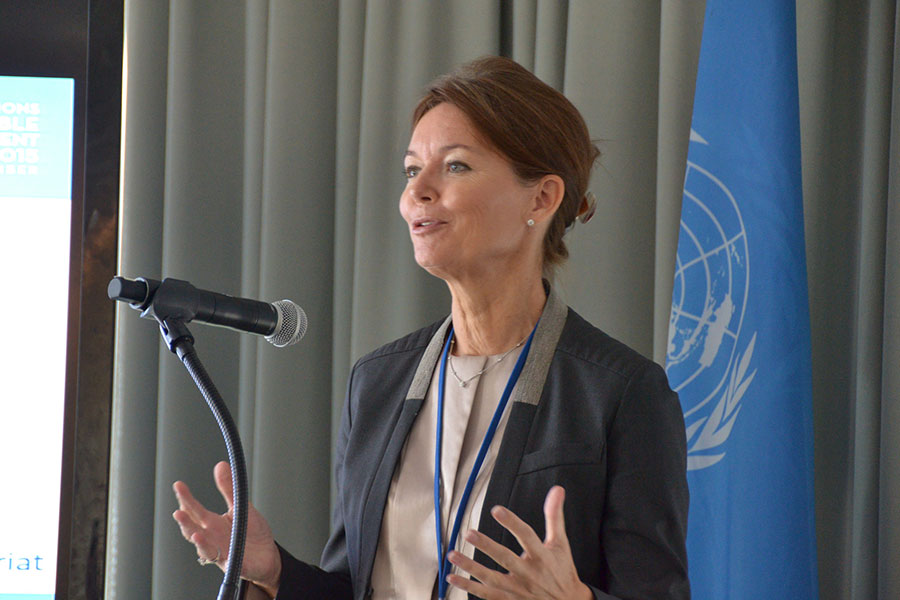Why have over 13,000 businesses (including Real Leaders) already joined the U.N. Global Compact in support of the new 17 Sustainable Development Goals for 2030? The answer is not what you might expect. Real Leaders founder Mark Van Ness sat down with U.N. Global Compact Executive Director Lise Kingo in New York to discuss how and why so many business leaders have begun making the success of humanity their business. Here are some of the highlights.
When we think of someone whose mission is to save humanity, we typically think of some fictional superhero with muscles bulging beneath brightly colored outfits. But Lise Kingo is not your stereotypical superhero. She’s a real leader with a job that would intimidate most people; mobilize the business leaders of the world to take immediate action to save humanity from self-destruction. Can you imagine her job-interview: “Can you give me an example of how you saved a species from extinction in your previous position?” Most of us would respond: “Er, can I get back to you on that?” But Lise Kingo appears confident, capable and compassionate in the face of seemingly unrealistic expectations. And a 2030 deadline. She’s bringing 25 years of business experience to a sector previously dominated by NGO’s and government agencies.
Amazingly, Kingo won’t be looking for business to give more. Instead, she’s presenting business leaders with the biggest business opportunities of their lifetimes. Over seven billion people are desperate for solutions to the 17 Sustainable Development Goals, solutions that will benefit everyone on the planet to varying degrees. The companies that come up with the most effective solutions will have access to billions of new customers and the subsequent profits. Huge business opportunities exist in each of these goals, from clean water and sanitation to sustainable communities and education. And if the profit motivator isn’t enough, Kingo points out the added benefit of: “leaving our children a world we can be proud of.”
For the skeptics out there, Unilever and McKinsey and Company have produced a report to show how achieving the Global Goals can add to the global economy and what the consequences will be if we choose to ignore them. After all, survival of the species is not enough for many people; they need to see the economic impact. This short-sighted view overlooks the devastating impact of conflict, climate disasters, forced migration and the resulting political and business uncertainty that results from the failure to anticipate social needs. This world view is also rapidly becoming obsolete, as leaders recognize the value and critical importance of far-sighted leadership.
For some reason, it took us thousands of years to realize that our species could benefit from agreeing on a set of long-term objectives for the joint success of humanity. Imagine the chaos that would ensue in an organization without clear objectives. That has been our world.
In 2000, the first eight goals were launched as the Millennium Development Goals with a 15 year horizon. Click here to see the success of those goals. These goals were replaced in 2015 by the 17 Sustainable Development Goals (SDG’s or Global Goals).
The idea, originally put forward by former Secretary-General Kofi Anan in Davos in 2000, was to create an ongoing campaign between business and the U.N., in the hope that companies would begin to align their strategies and operations with universal principles: human rights, labor, the environment and anti-corruption. The idea to establish global goals for humanity, just as you would for any successful organization, began 15 years ago with the Millennium Development Goals, an eight-point blueprint that focused on meeting the needs of the world’s poorest.

“While the Millennium Development Goals (MDGs) were good from a developmental perspective, they were created in the basement of the U.N. (in 2000) and had no intention of involving business, or the rest of the world,” says Kingo.
“Our principles were developed after a wide consultation with companies, civil society and governments and I think we ended up with a fair reflection of what the people of the world want,” explains Kingo.
With a Master of Science in Responsibility & Business Practice and a Bachelor of Commmerce in Marketing Economics, Kingo is uniquely positioned to see the best of both worlds. “We needed to launch the concept of the SDGs like a company would launch a new product,” she says. To achieve this, Kingo hauled out an old marketing strategy from her studies, that stressed the need for raising awareness, interest, desire and action in a product.
This strategy has resulted in the “Making Global Goals Local Business” campaign, that now has over 80 networks across the globe, each of which follows guidelines in a playbook that demonstrates how to organise local events with local companies.
While the U.N. is not yet under threat from being overrun by the business world, a start has been made. Each year business delegates from around the world will be meeting in New York to discuss how best to advance societal goals through business.
“We’re encouraging all companies to use the new goals to set a new direction for their business. It’s a way of managing risk while utilising opportunities,” says Kingo.
She wants to include both big and small companies and thinks that small companies are presently too invisible. “They are the ones that will be the medium or big companies of the future and we want to demonstrate that they too can make a major difference.”
Kingo believes leadership starts with small, individual steps and she is influenced by a good friend, Professor Gareth Jones from the London Business School, who wrote the book ‘Why Should Anyone Be Led By You?
“Jones’ definition of leadership is, ‘be yourself – more,’ and I really like that,” explains Kingo. “It means that if you want to be a leader you must continue to be yourself, not turn into someone else’s expectation of success. If you have points of view or special capabilities make them even more visible for your employees and stakeholders – don’t be afraid to say what you mean and don’t be afraid to take action and start something dramatic.”
This approach may be okay for the already converted, but how do you motivate companies that are clueless about sustainability, or might not even care?
Kingo’s attitude is that new business opportunities and profit will always be an attraction to entrepreneurs, regardless of the cause. “If we explain to companies how the new goals can help them create innovation and grow new market opportunities, then we move away from the ‘please help the U.N.’ message – which you can forget about. There must be something in it for business – a business plan. We also need to look our children and grandchildren in the eye one day without feeling we have failed them,” she says.
Kingo is out to create an army of business “pioneers” who will spread success stories far and wide. As the business arm of the U.N. she feels a special responsibility to translate the feel-good words of a charter into actionable items that any business person can understand.
“We have no plan B, and if we don’t achieve these goals in 15 years’ time, the world will basically be a wreck,” warns Kingo. “Look at the current data on poverty, refugees, how many countries are at war, environmental liquidation, how the temperature of the planet is increasing and the looming water crisis – we need to act now.”




































